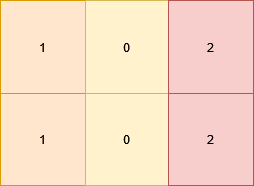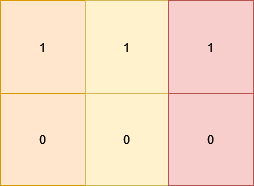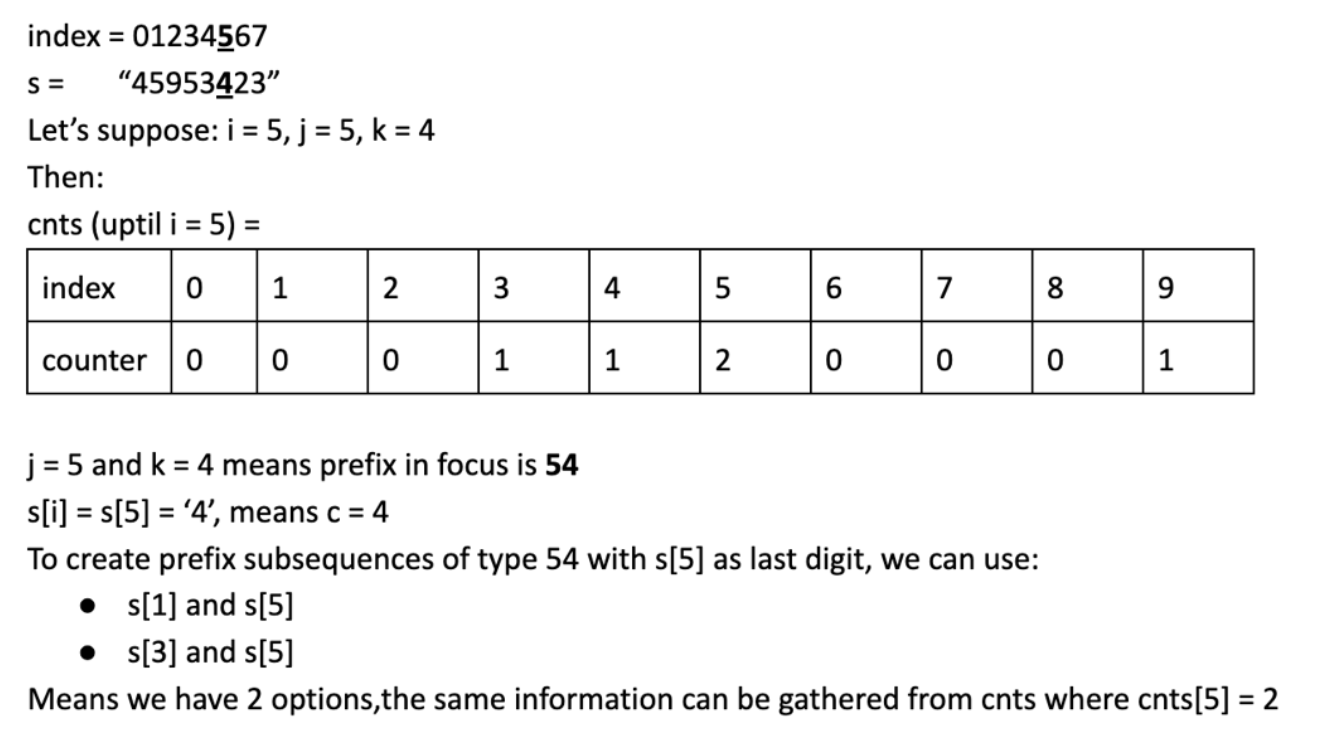dp 未分类题目
Given a string of digits s, return the number of palindromic subsequences of s having length 5. Since the answer may be very large, return it modulo 109 + 7.
Note:
- A string is palindromic if it reads the same forward and backward.
- A subsequence is a string that can be derived from another string by deleting some or no characters without changing the order of the remaining characters.
Example 1:
Input: s = "103301" Output: 2 Explanation: There are 6 possible subsequences of length 5: "10330","10331","10301","10301","13301","03301". Two of them (both equal to "10301") are palindromic.
Example 2:
Input: s = "0000000" Output: 21 Explanation: All 21 subsequences are "00000", which is palindromic.
Example 3:
Input: s = "9999900000" Output: 2 Explanation: The only two palindromic subsequences are "99999" and "00000".
Constraints:
1 <= s.length <= 104sconsists of digits.![]()
class Solution { public int countPalindromes(String s) { // 计算左侧的两位排列个数 int[][][] l2r = countLeftToRight(s); // 计算右侧的两位排列个数 int[][][] r2l = countRightToLeft(s); int MOD = 1000_000_007; long result = 0; // 从第3个元素开始,计算左右侧100中情况的count,相加 for(int i = 2; i < s.length() - 2; i++) { for(int j = 0; j < 10; j++) { for(int k = 0; k < 10; k++) { result += 1l * l2r[i - 1][j][k] * r2l[i + 1][j][k]; result = result % MOD; } } } return (int)result; } private int[][][] countLeftToRight (String s) { // 记录当前某数字出现的次数 int[] cnt = new int[10]; int[][][] count = new int[s.length()][10][10]; // i为当前第二个数字的位置 for(int i = 0; i < s.length(); i++) { int c = s.charAt(i) - '0'; if(i > 0) { // j 为第一个数字 0~9 for(int j = 0; j < 10; j++) { // k 为第二个数字 0~9 for(int k = 0; k < 10; k++) { count[i][j][k] = count[i - 1][j][k]; // 如果k是当前数字,那么当前的count要加上 if(c == k) count[i][j][k] += cnt[j]; } } } cnt[c]++; } return count; } private int[][][] countRightToLeft (String s) { // 记录当前某数字出现的次数 int[] cnt = new int[10]; int[][][] count = new int[s.length()][10][10]; for(int i = s.length() - 1; i >= 0; i--) { int c = s.charAt(i) - '0'; if(i < s.length() - 1) { for(int j = 0; j < 10; j++) { for(int k = 0; k < 10; k++) { count[i][j][k] = count[i + 1][j][k]; if(c == k) count[i][j][k] += cnt[j]; } } } cnt[c]++; } return count; } }
You are given a 2D matrix grid of size m x n. In one operation, you can change the value of any cell to any non-negative number. You need to perform some operations such that each cell grid[i][j] is:
- Equal to the cell below it, i.e.
grid[i][j] == grid[i + 1][j](if it exists). - Different from the cell to its right, i.e.
grid[i][j] != grid[i][j + 1](if it exists).
Return the minimum number of operations needed.
Example 1:
Input: grid = [[1,0,2],[1,0,2]]
Output: 0
Explanation:

All the cells in the matrix already satisfy the properties.
Example 2:
Input: grid = [[1,1,1],[0,0,0]]
Output: 3
Explanation:

The matrix becomes [[1,0,1],[1,0,1]] which satisfies the properties, by doing these 3 operations:
- Change
grid[1][0]to 1. - Change
grid[0][1]to 0. - Change
grid[1][2]to 1.
Example 3:
Input: grid = [[1],[2],[3]]
Output: 2
Explanation:

There is a single column. We can change the value to 1 in each cell using 2 operations.
Constraints:
1 <= n, m <= 10000 <= grid[i][j] <= 9
class Solution { /** 思路:题目实际要求同一列数据要一样,相邻列的数据不能一样 每一列数据都有10种选择:0~9, 这列的下一列数据也有0~9 10种选择 给定下一列数据的0~9 10种选择的cost情况下, 只需要判断当前列N = 0~9 10种情况: 当前列选N的cost = 自身列全部置为N的cost + 下一列数据的不选择N的最小cost 边界条件:最后一列数据的"下一列cost" 为 0 */ public int minimumOperations(int[][] grid) { int[] result = helper(grid, 0); int min = Integer.MAX_VALUE; for(int cost : result) { min = Math.min(min, cost); } return min; } private int[] helper(int[][] grid, int col) { int m = grid.length, n = grid[0].length; int[] result = new int[10]; // 边界条件:最后一列数据的"下一列cost" 为 0 if(col == n) return new int[10]; // 初始化当前列10种方案的cost为无穷大 Arrays.fill(result, Integer.MAX_VALUE); // 统计当前列频次分布 int[] count = cnt(grid, col); // 计算下一列的10种情况cost int[] next = helper(grid, col + 1); // 计算当前列选去N:0~9 10种情况下的cost, for(int N = 0; N < 10; N++) { int selfCost = m - count[N]; // 当前列选的cost = 自身列全部置为N的cost + 下一列数据的不选择N的最小cost result[N] = selfCost + min(next, N); } return result; } //统计某列的各数字个数 private int[] cnt(int[][] grid, int col) { int[] result = new int[10]; for(int i = 0; i < grid.length; i++) { result[grid[i][col]]++; } return result; } //给定0~9统计数据 和 val,找出val除外 private int min(int[] last, int val) { int min = Integer.MAX_VALUE; for(int i = 0; i < 10; i++) { if(i != val) min = Math.min(min, last[i]); } return min; } }





 浙公网安备 33010602011771号
浙公网安备 33010602011771号